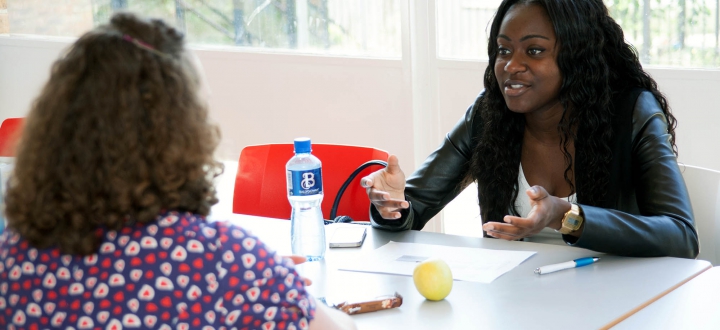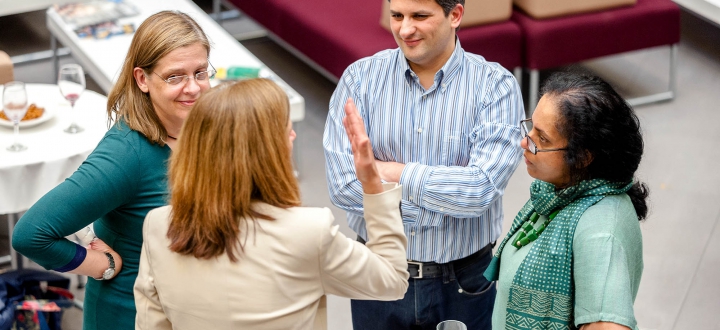Catching up with... Kerry Sampayo
 Kerry Sampayo studied MSW Social Work and graduated from Kingston University in 2019. Kerry has varied experience of working with children, young people, families and vulnerable adults, including social worker roles at The Children's Trust, National Fostering Group and Surrey County Council and is currently a Family Court Adviser at the Children and Family Court Advisory and Support Service (Cafcass).
Kerry Sampayo studied MSW Social Work and graduated from Kingston University in 2019. Kerry has varied experience of working with children, young people, families and vulnerable adults, including social worker roles at The Children's Trust, National Fostering Group and Surrey County Council and is currently a Family Court Adviser at the Children and Family Court Advisory and Support Service (Cafcass).
Tell us about a typical day in your role at Cafcass?
The way I like to summarise my role is that I am here to represent children and young people in court, and to do my absolute best to help the family court make the right decision for those children and young people. I work in a private law team so the majority of my work involves supporting families within the court arena to focus on their child's needs and come to an agreement about how much time each parent spends with their child, what that time should look like, and who that child should live with.
Another area that I get involved with is Parental Order reporting which is the process of supporting families who have had a child through a surrogacy arrangement to obtain parental responsibility for their child. Both processes are reliant on thinking about safeguarding and the best interests of that child.
One of the things I love about working for Cafcass is that there are many versions of a typical day in my role! This ranges from visiting children in their home, school or nursery to understand their wishes and feelings, meeting with parents to explore any issues within the context of their child or children's needs, speaking with external agencies to gather additional information, reflecting on my work with families and strengthening my assessment with practice aids, report writing, and giving evidence in court hearings.
What is the biggest challenge and the biggest reward in your work?
I find that the biggest challenge is trying not to be drawn into parental conflicts, particularly when these are long-standing. Families become involved with private law proceedings for a number of reasons, but a common factor is that things have got so difficult and complex that families don't feel they can make decisions without the court's help. This means there are usually heavy emotions involved and I find it important to remind myself just how emotionally draining court proceedings can be for families. This can make it difficult to not feel pulled in both directions sometimes, as both parents are often desperate to feel heard and understood. It definitely takes skill to listen to parents and be empathetic towards their position whilst also staying impartial, neutral and, fundamentally, keeping things centred on the child or children.
The biggest reward is being a child or young person's voice in the court arena. It really is a privilege when a child decides that they trust me to represent their wishes and feelings. It is hard to put words to the sense of pride I have in a child when, despite how scary the process must be for them, they choose to open up about their life and share whatever they feel they need to with me. It is also hugely rewarding when, at the end of proceedings, decisions are made that reflect what the child or children wanted, and hopefully serve as a reminder for them just how powerful and important their wishes and needs are.
What drives your passion for social work?
Typically, the association most people have with the social work profession isn't always positive – this is largely driven, in my view, by the media. Social work is certainly not a perfect profession and the system has many flaws, but something that I pride myself on as a social worker is being part of a system that is constantly evolving and developing. We expect change and development from those we support so we must model this ourselves as individual practitioners and as a wider system. Every time I work with a new family, I see an opportunity to give them a positive experience of social work and to show them what social work is really about – for me, this is about supporting, empowering and safeguarding.
In a career centred on supporting others, what self-care tools help you?
I've learned throughout my time in social work so far that boundaries are a must! We just cannot give our best to those we are supporting if we do not practice what we preach and look after ourselves first and foremost. This looks different for everyone but, for me, this is about utilising annual leave and making sure I'm taking regular breaks throughout the year, trying to limit working outside my usual hours as much as possible, and making sure that I have breaks throughout my working day. This is not an easy thing to achieve in a high-pressure job like social work, but I've learned the hard way just how important it is to stick to these boundaries as much as I can – it really does make a difference and means I can be a better practitioner in the long-run.
It's also really important to have the support of others who ‘get it'. For me, these are my friends that I gained whilst studying at Kingston University. We are all still social workers and all work in different teams and areas of social work practice, but no matter how different our workloads we understand the challenges that our jobs bring and are always there for each other if we need a bit of support or just a space to offload.
Which graduate skill do you feel will be most valued in social work in the future?
Reflection skills! It is so important to be able to reflect because this should lead to development. This may be reflecting on an assessment, on a visit you've completed, on your observations of an individual or it could also be reflecting on your own biases and values and their role in your work. It should always involve reflecting on your own practice and celebrating the elements you're proud of and identifying ways you'd like to continue improving that practice.
I used to get stressed about reflective activities at university but have now reached a point in my practice where I'm constantly reflecting every day – that reflection just happens through supervision, peer discussions and my own thoughts, rather than in a formal reflective template or essay!
What's your favourite memory as a Kingston student?
I used to really like the days that we would have at university throughout our placements. Coming back together as a group felt really special because you could almost feel everyone's increased confidence in the air! There was a definite tangible excitement about those days, and it was so valuable hearing about everyone's different experiences. It was also helpful to get peer support if anyone was having a wobble or needed to talk any issues through. I think those days were the perfect summary of what it means to be a social work student and just how unique it is to be studying in such a practical way.
Contact us
Development, Alumni Relations and Engagement (DARE)
2nd Floor, Main Building
Penrhyn Road
Kingston upon Thames
Surrey KT1 2EE
Tel: +44 (0)20 8417 3664
Email us
Share your news
We love hearing from all Kingston graduates – no piece of news is too big or small, so whatever you have done or are about to do, email us and let us know!
Contact us
Development, Alumni Relations and Engagement (DARE)
2nd Floor, Main Building
Penrhyn Road
Kingston upon Thames
Surrey KT1 2EE
Tel: +44 (0)20 8417 3664
Email us

